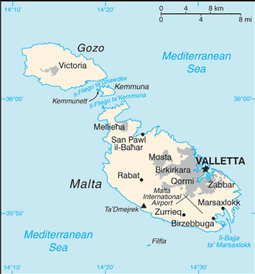Malta
 Malta is country of Europe located in south Europe - Mediterranean Sea.
Malta is country of Europe located in south Europe - Mediterranean Sea.
Details
| Official Name: | Republic of Malta |
| Capital: | Valletta |
| Total area: | 316 km2 |
| GDP per capita: | $27,022 |
| Native Language: | Maltese, English |
| Government: | Parliamentary republic |
| Population: | 452,515 |
| Major Religion: | Roman Catholicism |
| Monetary Unit: | Euro (EUR) |
Malta is a group of seven islands in the Mediterranean Sea. Only the three largest islands - Malta, Gozo and Comino - are inhabited. The terrain is low and rocky with coastal cliffs.
Malta, in the heart of the Mediterranean, is a melting pot of civilisations with a history stretching back thousands of years. The country has been inhabited since around 5200 BC and a significant prehistoric civilisation existed on the islands prior to the arrival of the Phoenicians who named the main island Malat , meaning safe haven. Later the islands were for centuries the seat of the Order of Knights of the Hospital of St John and then part of the British Empire. Malta became independent in 1964.
The Maltese government is headed by the leader of the party with a majority of seats in the unicameral House of Representatives, known in Maltese as Kamra tar-Rappreżentanti.
The national language is Maltese, which is part of the Semitic language family that includes Arabic. English is also recognised as an official language, and many Maltese also speak Italian.
Tourism is important in Malta but the island also has an expanding services sector.
Traditional Maltese food includes soup (minestrone, fish), pasta and pastry dishes. Stuffed dishes are also a feature of Maltese cuisine. Stuffat Tal-Fenek (rabbit stew) is a national dish.
Health & Welfare
The Maltese health care system provides comprehensive coverage for all citizens. Free pharmaceuticals are offered to low income workers.
Economy & Jobs
Agriculture and tourism.
Main Attractions
Valetta, Gozo island, Mdina city (3000 years old), and Ħaġar Qim temple.
Economy
Malta is classified as an advanced economy together with 32 other countries according to the International Monetary Fund (IMF). Until 1800 Malta depended on cotton, tobacco and its shipyards for exports. Once under British control, they came to depend on the dockyard for support of the Royal Navy, especially during the Crimean War of 1854. The military base benefited craftsmen and all those who served the military.
In 1869, the opening of the Suez Canal gave Malta's economy a great boost, as there was a massive increase in the shipping which entered the port. Ships stopping at Malta's docks for refuelling helped the Entrepôt trade, which brought additional benefits to the island.
Immigration and residency
If you are interested in moving to the countries, either with a residence permit or by acquiring a citizenship, please contact us, and also get acquainted with the relevant migration documents.